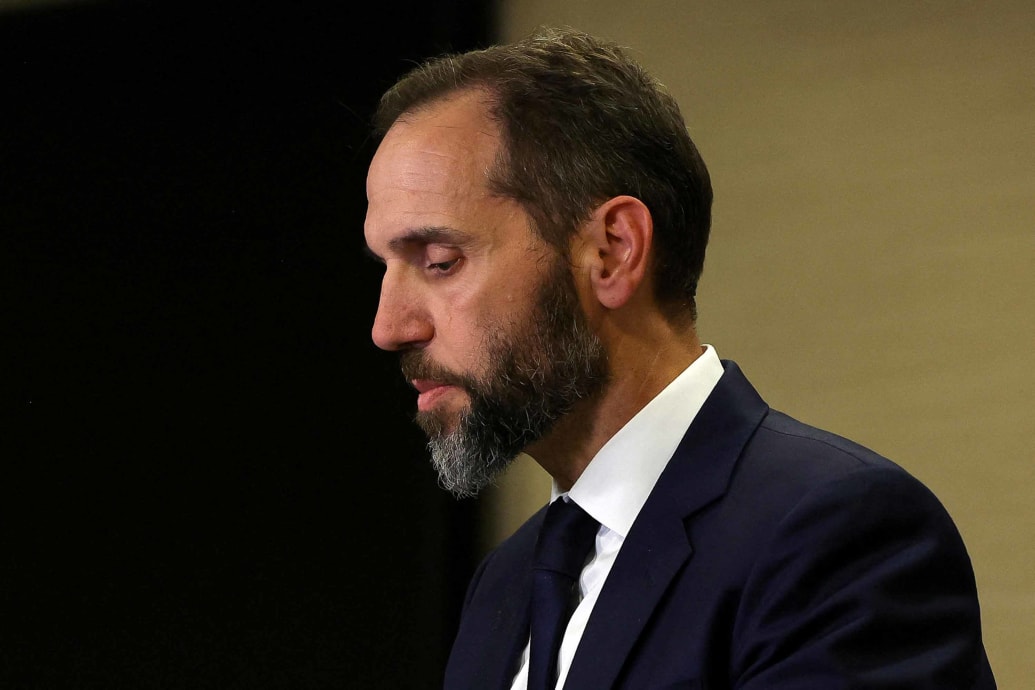The tables have turned.
Had everything gone according to plan, Donald Trump would be on trial right now in South Florida for hoarding classified documents at his Mar-a-Lago ocean estate after leaving the White House. The politician, still licking his wounds from his New York conviction, would be desperately fighting to stave off a humiliating distinction: becoming the first former president to be branded a two-time felon.
Instead, a very different trial of sorts will be underway this Friday at a tiny federal courthouse in the sunny beach city of Fort Pierce—one that will awkwardly put the Department of Justice on the defensive, with government lawyers asserting their most fundamental right to even try this historic case.
All the pressure will be on Special Counsel Jack Smith, the roguish-looking federal prosecutor whose quiet demeanor has only added to the gravitas of this legal fight.
Meanwhile, Trump won’t even need to be there, leaving the top Republican presidential candidate free to continue criss-crossing the country, while the prosecutor that’s been on his tail for a year is stuck in a courtroom.

Supporters of former President Donald Trump stand outside of the Alto Lee Adams Sr. U.S. Courthouse on March 1, 2024 in Fort Pierce, Florida.
Joe Raedle/Getty
The power dynamic has shifted, and it’s all due to one person: U.S. District Judge Aileen Cannon.
“Judge Cannon is a disgrace to the concept of impartiality and integrity on the federal bench. This case should already have been tried to a verdict,” said Dennis Aftergut, a former federal prosecutor who has monitored the Mar-a-Lago case.
Her MAGA-friendly rulings have managed to delay the case so badly that it now looks as if Trump might escape trial altogether if he manages to win the national election in 138 days. After all, what’s the point of prosecuting a man who, as president, can order his attorney general to simply kill the investigation—or choose to pardon himself? Trump has made clear he has no intention of respecting the DOJ’s independence if he returns to office, despite the fact that both options are red lines of corruption so familiar to banana republics around the world.
Cannon continues to push back key deadlines and give in to Trump’s delay tactics by considering legal arguments that other judges have quickly dismissed. In her latest move, she’ll explore whether Attorney General Merrick Garland even had the authority to appoint Smith as special counsel on Nov. 18, 2022—a DOJ practice that has been used several times in high-profile cases without any successful challenge and has become standard in American politics.
At the start of the year, the judge wouldn’t prioritize setting aside a couple of days to review the classified material at the core of the case. By contrast, she’s dedicating all-day Friday for a hearing that will serve as a mini-trial.
Starting promptly at 9:30 a.m., she’ll hear from lawyers on both sides, review evidence in court, and even entertain novel arguments from outside parties who want to weigh in. And if that weren’t enough, Cannon earlier this month indicated that she’s willing to review “supplemental briefs” afterward—opening the possibility that this could take weeks.
Trump’s lawyers want the indictment to be dismissed in its entirety, a bid premised on the notion that Smith is powerless and his appointment “invalid.” They point to the Constitution, arguing that his “office of the special counsel” wasn’t first approved by Congress.
“The Appointments Clause does not permit the attorney general to appoint, without Senate confirmation, a private citizen and like-minded political ally to wield the prosecutorial power of the United States. As such, Jack Smith lacks the authority to prosecute this action,” they wrote in February.

Jack Smith looks on as he makes a statement to reporters after a grand jury returned an indictment of former President Donald Trump in the special counsel’s investigation of efforts to overturn his 2020 election defeat, at Smith’s offices in Washington, DC on August 1, 2023
Kevin Wurm/Reuters
In March, the DOJ countered by pointing to history. Special counsels have been used to investigate all kinds of political scandals, dating back to the presidency of James A. Garfield in the 1880s.
The Supreme Court already took a look at this in 1974, when it decided during the Nixon affair that the AG does indeed have the authority to appoint a special prosecutor. Since then, there have been special counsels during every single presidential term—even during Trump’s time in office. Prosecutors noted how the appellate court in D.C. came to the same conclusion when it backed the appointment of Robert Mueller to explore Trump’s Russiagate debacle.
“Congress has also long demonstrated its understanding that the attorney general has authority to appoint special counsels by repeatedly appropriating funds for the attorney general to compensate them,” prosecutors wrote.
But here come the experts.
Last week, a band of conservative activists threw its support behind Trump, arguing that the real problem here is that the AG shouldn’t have plucked Smith from his job as an anti-corruption prosecutor in Europe, and instead should have tapped one of the nation’s active 93 Senate-confirmed U.S. Attorneys. The Trump-friendly argument conveniently says that “nearly all the special prosecutors appointed during the past 40 years—aside from Smith and Robert Mueller—have been lawfully appointed.”
That group includes Edwin Meese III, who served as Ronald Reagan’s AG, Michael B. Mukasey, who was George W. Bush’s AG, and a favorite foe of the American progressive movement: Citizens United, the force behind the Supreme Court’s landmark decision that allowed corporations to spend unlimited funds on elections. Their 11-page screed villainizes Smith for targeting Trump.
“Smith’s prosecution here shows that he wields the power to profoundly alter the trajectory of a presidential election, and with it the destiny of the nation. He is thus one of the most powerful officials in the entire United States government. The idea that he can exercise that enormous power without Senate confirmation is intolerable, and even worse, the idea that he can do so without holding an office created by Congress is unthinkable,” they wrote.
Donald Ayer, a former U.S. Attorney who also served as George H.W. Bush’s deputy AG, thinks it’s time for a reality check.
“It’s a trivial question that ought not to have any serious consideration at all. We’ve had numerous cases that have gone forward before, and it’s not a serious argument that’s being made,” he told The Daily Beast. “The case has been unnecessarily delayed and it should be much farther than it is. Indeed, it probably should have gone to trial.”
Friday marks the two-year anniversary since Trump’s White House valet, Walt Nauta, testified before a grand jury in D.C. and gave prosecutors key details that helped the FBI justify its search warrant.
On June 21, 2022, Nauta recalled packing Trump’s “crazy amount of undershirts, socks, underwear, hairspray” at the White House and later moving around bankers boxes at Mar-a-Lago—some of which investigators would later discover were stuffed with classified documents. During that session, the loyal Trump aide recalled how his boss limited the number of boxes that would be reviewed before sending them back to the National Archives—a potentially damning admission that could hint at Trump’s refusal to hand them all back when he was asked to.
“Once I started putting them in there—he was like, okay, that’s it,” Nauta said at the time.
Fast-forward to now, and Smith will be fighting to keep the case alive. If Cannon rules against him, legal scholars say he might have the ammunition he needs to finally request the judge’s recusal from the case.
But no matter what happens on Friday, Judge Cannon has already gotten what she wanted. The case has been pushed back so far that legal experts say it’s unlikely it will go to trial before the election.





